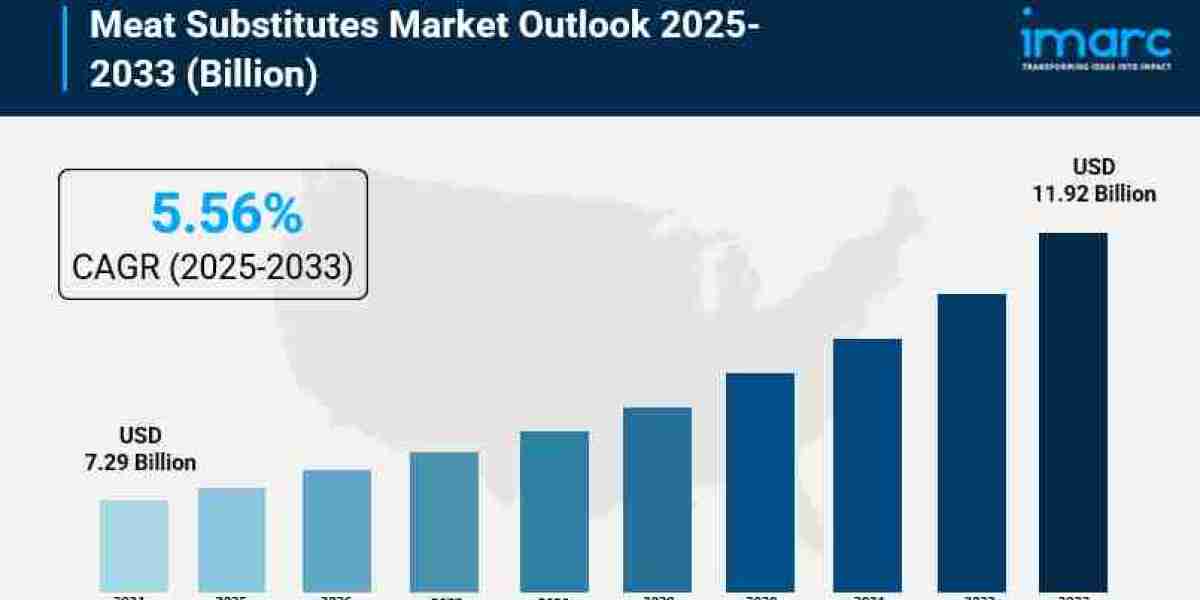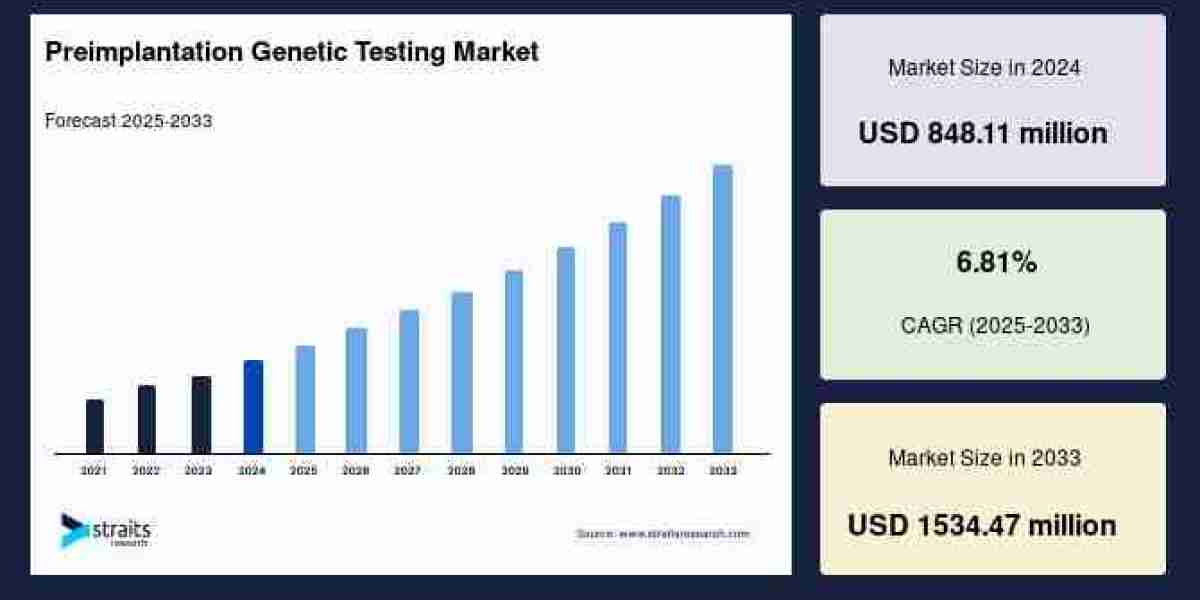IMARC Group, a leading market research company, has recently released a report titled “Meat Substitutes Market Size, Share, Trends and Forecast by Type, Source, Category, Distribution Channel, and Region, 2025-2033.” The study provides a detailed analysis of the industry, including the global meat substitutes market size, share, trends, and growth forecast. The report also includes competitor and regional analysis and highlights the latest advancements in the market.
Meat Substitutes Market Highlights:
- Meat Substitutes Market Size (2024): Valued at USD 7.29 Billion.
- Meat Substitutes Market Forecast (2025–2033): The meat substitutes market size is expected to reach USD 11.92 billion by 2033, growing at a CAGR of 5.56%.
- Growing Demand: Increasing consumer interest in plant-based diets drives market growth.
- Health Consciousness: Rising awareness of health benefits associated with meat alternatives boosts sales.
- Sustainability: Environmental concerns lead consumers to seek sustainable protein sources.
- Innovation: Continuous product innovation enhances taste and texture, attracting more consumers.
- Investment: Significant investments from major food companies in plant-based products.
- Diverse Offerings: A wide range of products, including soy, pea protein, and mycoprotein, cater to different dietary preferences.
- Market Expansion: Growth in retail and online distribution channels facilitates access to meat substitutes.
- Global Trends: The market is expanding globally, with significant growth in North America and Europe.
Claim Your Free “Meat Substitutes Market” Insights Sample PDF: https://www.imarcgroup.com/meat-substitutes-market/requestsample
Our report includes:
- Market Dynamics
- Market Trends and Market Outlook
- Competitive Analysis
- Industry Segmentation
- Strategic Recommendations
Industry Trends and Drivers:
Meat Substitutes Market Report Segmentation:
· Consumer Focus on Health, Wellness, and Flexitarianism:
The major driver is a broadening perception of health and wellness among consumers, particularly among the Millennials and Generation Z segments. Consumers are increasingly concerned about health benefits and increasingly demand foods that are perceived to be healthy, thus driving the flexitarianism, a diet that is mainly, but not exclusively, plant-based. They are not necessarily vegetarian or vegan but are looking for ways to swap out meat several times a week to reduce animal fat, cholesterol and exposure to hormones. This health conscious group has pushed demand for meat alternatives to be "clean label" products. These products are made from recognizable minimally processed ingredients and often contain added fiber and protein (pea, soy, mushroom). Market launches have increasingly presented these benefits, positioning plant-based foods as leading dietary choices for nutritional wellness and preventative health rather than alternative products for animal-derived foods.
· Environmental Sustainability and Ethical Consumption:
One of the largest factors that grows the market is that consumers know the customary livestock farming negatively affects things since it meaningfully contributes to greenhouse gasses emitting, forests deforesting, land and water using, and biodiversity losing. An increasing number of consumers choose plant-based protein to reduce their carbon footprint and participate in sustainability efforts. Especially among eco-aware consumers, there is a popular notion that purchasing decisions are actions against climate change. Food producers and restaurant chains responded to this awareness through touting meat alternatives with strong sustainability credentials, offering explicit reductions when using water or regarding the carbon footprint versus producing beef or pork. Sustainability gains favor as the ethical choice, and the meat substitute aisle shows the most explicit example.
· Next-Generation Product Innovation and Sensory Experience:
Beneath the environmental, health, and ethical motivations, the first hurdle to overcome has been texture and taste. This driver is the product itself and involves the research and development of a product that will mimic both forms and eating experience of meat. This is referred to as the "holy grail". Most innovation concerns ingredient science, including qualitative improvement of pea protein, fungi or microalgae, and processing technologies such as high-moisture extrusion (HME), which can model the fibrous and muscular structure of meat fibers. Still unproven, precision fermentation and cellular agriculture may be able to recreate proteins with the texture, taste and mouthfeel characteristics of animal fat. A gradual increase in sensory acceptance is important to win over habitual meat-eaters, and to move these meat replacement products out of the health food aisle and into the supermarket and fast food outlets.
Breakup by Type:
- Tofu & Tofu Ingredients
- Tempeh
- Textured Vegetable Protein (TVP)
- Seitan
- Quorn
- Others
Breakup by Source:
- Soy
- Wheat
- Mycoprotein
- Others
Breakup by Category:
- Frozen
- Refrigerated
- Shelf-Stable
Breakup by Distribution Channel:
- Supermarkets and Hypermarkets
- Health and Food Stores
- Convenience Stores
- Others
Breakup By Region:
- North America (United States, Canada)
- Asia Pacific (China, Japan, India, South Korea, Australia, Indonesia, Others)
- Europe (Germany, France, United Kingdom, Italy, Spain, Russia, Others)
- Latin America (Brazil, Mexico, Others)
- Middle East and Africa
Who are the key players operating in the industry?
The report covers the major market players including:
- The Nisshin Oillio Group
- Dupont
- Archer Daniels Midland
- Amy's Kitchen
- Conagra Brands
- Quorn Foods
- Cauldron Foods
- Campbell Soup Company
- VBites
- Blue Chip Group
- Field Roast
- Garden Protein International
- LightLife
- Sweet Earth Foods
- MGP Ingredients
- Tofurky
- Meatless
- Sonic Biochem Limited.
Ask Analyst For Request Customization: https://www.imarcgroup.com/request?type=report&id=1582&flag=E
If you require any specific information that is not covered currently within the scope of the report, we will provide the same as a part of the customization.
About Us:
IMARC Group is a global management consulting firm that helps the world’s most ambitious changemakers to create a lasting impact. The company provides a comprehensive suite of market entry and expansion services.
IMARC offerings include thorough market assessment, feasibility studies, company incorporation assistance, factory setup support, regulatory approvals and licensing navigation, branding, marketing and sales strategies, competitive landscape and benchmarking analyses, pricing and cost research, and procurement research.
Contact US:
IMARC Group
134 N 4th St. Brooklyn, NY 11249, USA
Email: sales@imarcgroup.com
Tel No:(D) +91 120 433 0800
United States: +1-201971-6302








